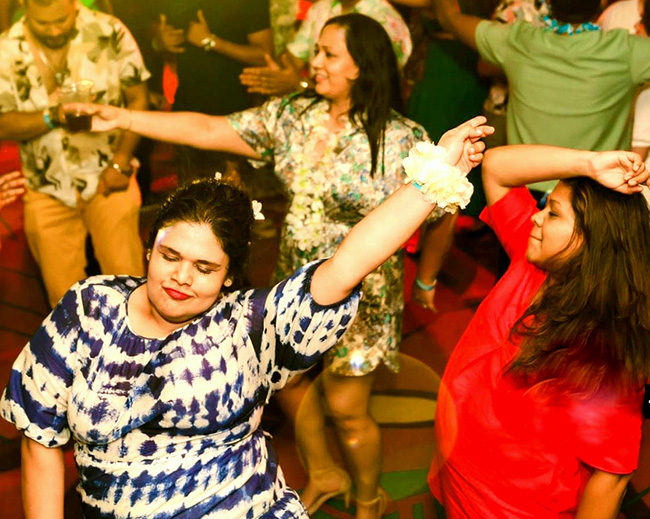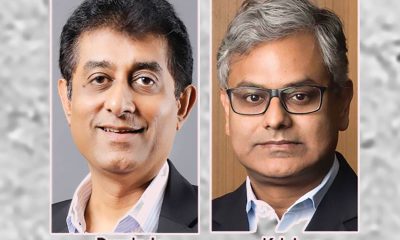Features
God save America!

By Dr Upul Wijayawardhana
To say that it was painful to watch the first US presidential debate is perhaps a gross underestimation! Seeing President Biden shuffling his way to the podium with a vacant stare would surely have made his supporters’ hearts sink. As quipped by a young relative of ours who was watching the programme with us, to most of us it appeared to be ‘elder abuse’, similar comments being made after the debate by some US commentators, too. Being in the same age group, as the two presidential contenders, obviously, I cannot afford to be ageist but it is well known that what matters is the biological age, not numerical, but Biden showed all of his 82 years, or more in fact! His pathetic performance gives reasons for grave concern. Though Trump is only three years younger, it looked as if there was a 30 years age difference; yet another comment confirmed by many US political commentators. Trump appeared more presidential, was clear in what he said and was more convincing even when he was stretching the truth! Still, one is left aghast why the mighty US cannot find anyone more suitable than these two for the presidency!
Forget about the next term, due to start in six months, but, as things stand, many would have wondered watching the erratic performance of Biden whether he is fit now to hold the position of the most powerful person on earth? Some go to the extent of referring to the American President as the leader of the free world but it is a matter of opinion, many hastening to disagree. Even if he is not, he is the most powerful person with the biggest war arsenal at his disposal. Raging wars in two theatres, almost verging on a Third World War, it is a frightening thought whether Biden would be able to press the ‘Nuclear Button’ without help. Fortunately, there is no button as such ‘Nuclear Button’ being a figurative term referring to the power to use nuclear weapons; a complex process. It should not be forgotten that the Nuclear Button had been pushed not once but twice, with devastating consequences, only by a predecessor of Biden but not by any other leader of a nuclear state.
Since the 1960 Kennedy-Nixon TV debates, the first of which was unexpectedly won by Kennedy, ultimately leading to his victory, Presidential Debates have been a regular feature and usually take place after the candidates have been endorsed at respective party conventions. The debate on 27 June, hosted by CNN, was the first ever to be held before the party conventions and had been scheduled early at the request of the Biden camp. Biden had been preparing for the debate, spending a week in Camp David.
The format dictated no notes, no assistance and strict time limits with microphones switched on, only at appropriate times. In fact, this helped Trump as it prevented what appeared to be aggressive behaviour in 2020 debates.
American commentators may be biased and their judgement may well be clouded by party affiliations. BBC may give a ‘distant view’ and this is what Anthony Zurcher, BBC’s North America correspondent, commented at the end of the debate:
“Before Thursday evening, many Americans had expressed concerns about Joe Biden’s age and fitness for office. To say that this debate did not put those concerns to rest may be one of the greatest understatements of the year. The President came into the debate with a low bar to clear, and he stumbled. He was flat. He was rambling. He was unclear.
About midway through the debate, the Biden campaign said that the President was battling a cold – an attempt to explain his raspy voice. That may be so, but it also sounded like an excuse. For 90 minutes, more often than not, he was on the ropes. Particularly early in the evening, some of his answers were nonsensical. After losing his train of thought he ended one answer by saying, “We finally beat Medicare” – an odd reference to the government-run healthcare programme for the elderly.”
For the most part, Biden was incoherent and rambling, at times he stopped mid-sentence and appeared to be lost in his thoughts, struggling to complete sentences. On one occasion, on being asked to respond, Trump said “I really don’t know what he said at the end of that sentence, and I don’t think he did, either,”
Those attempting to defend Biden have opined that though he lost on presentation, he won on facts and that Trump lied throughout. However, fact checking by various agencies have established that both were stretching the truth, at times!
The outcome of the debate may not affect the committed voters, but it may well sway the undecided voters, and Trump’s narrow lead may increase. Anyway, as the election of the US President is not on the popular vote but on a complicated collegiate system Biden may still win but did the debate give confidence to the world of a successful second Biden presidency?
Biden appeared infirm, both physically and mentally. Trump stated that he had two evaluations of his mental capacity and his question whether Biden would take the tests were left unanswered. At the end of the debate, Jill Biden had to come and escort him further demonstrating his inabilities. At a meeting following the debate, it was hilarious Jill Biden telling her husband “You did well Jo, you answered all the questions”, reminiscing of a Montessori class!
We think our politicians are bad and it is gratifying to note that there are much worse ones in so-called advanced countries, too! Biden, when he contested four years ago, stated that he was standing to prevent Trump getting a second term and that he would reverse the damage done by Trump to hand over to a younger person. Like our politicians, having tasted power, he does not want to give up though the best thing he can do for his country is to withdraw.
Though there are rumblings in his party, there is no mechanism to replace Biden, the only avenue open being him opting to withdraw. That does not seem to be happening, at least for the time being. If he does not and wins the race in November, the only choice left is to say: “God save America!”
Features
Men or mice? Sri Lanka at debt negotiations

BY SANJA DE SILVA JAYATILLEKA
Sirasa TV1’s Public Platform (anchored by Sonali Wanigabaduge) of 29th June is only the latest in a series of valuable, one might say crucial, civil society and independent media initiatives to bring more clarity on Sri Lanka’s debt crisis and the on-going negotiations believed to be rescuing us from it.
Despite government hype, experts with impeccable credentials that appeared on this and other programmes like it, are seriously worried about the on-going restructuring efforts which seem to be characterised by capitulation to creditor interests rather than responsible negotiations in order to achieve a fair deal for the people of Sri Lanka.
On this particular TV programme, Prof Jayati Ghosh, joined by Germany’s Christina Rehbein (member of the European Network on Debt and Development) threw a completely different light on what we are led to believe is the problem and its only solution. It appears that Sri Lanka’s negotiators’ understanding of “good news” was to settle for a creditor-friendly, shortsighted solution at the expense of its own citizenry.
The government’s recent self-congratulatory hype needs serious re-scrutiny.
Our Right to Sustainable Solutions
It was at an event at the SLFI, organized by Ahilan Kadirgamar and the newly-founded Yukthi, that first brought an alternative perspective on Sri Lanka’s debt crisis. The public event had Jayati Ghosh, Martin Guzman and Charles Abugre on their panel. Yukthi deserves our deepest gratitude for this initiative at which we came to know that the usual narrative of corruption and bad governance which had been fed to us, including by the populist Opposition, as the primary reason for our plight, was a lesser cause for the crisis.
These scholar-practitioners spoke about other, bigger systemic and structural reasons for this crisis, with the structure being the current international financial architecture as it is constituted today. This structure and its processes are being challenged and sought to be corrected at this moment, including through an initiative of Pope Francis as well as one by the Secretary-General of the UN. Jayati Ghosh was on an important advisory panel to the Secretary-General, the report of which seeks to reform the existing, flawed system.
At the Yukthi event, and reiterated later on TV1’s People’s Platform by Jayati Ghosh, it was pointed out that there have been successive debt cycles going back to the 1970s. After the 2008 financial crisis in the West, there was an excess of liquidity floating in the Western economies, which needed investing for profit. Thus began the untrammeled lending to emerging economies to the delight of the elites running those countries. As the experts pointed out, it takes two to manufacture debt, with responsibility on both sides for the risks. But the lenders, while recognizing the danger of lending to certain higher-risk countries, nevertheless weren’t deterred. They introduced a risk premium to cover that risk. The private money markets made it easy to borrow, and many countries did, including ours, at high interest rates.
However, when the risk actually came to pass and some countries defaulted, the lenders refused to take any responsibility for making a bad investment and demanded the full pound of flesh, while having made plenty of profit on the lending already. All the blame was put on the borrower country which then squeezed its citizens to extract the penalty for which they were not responsible.
This, we are told by the progressive experts, does not have to be the last word on the subject. Countries have the right, yes, the right, to negotiate a deal in which both parties to the contract take responsibility. This includes a substantial haircut on the borrowing; a cap on interest rates; debt standstill until new terms are negotiated so the interest doesn’t pile up while the creditors drag their feet; and critically questioning the IMF programmes which are meant to help with recovery.
17th Going On 18th?
It was on TV1’s Public Platform that it was revealed that the mandatory IMF programme, which is considered imperative for negotiations of debt restructuring, is not required by international law. It is only that creditors insist on it. From their perspective, it is probably seen as necessary to introduce some fiscal discipline to errant elites. However, this doesn’t mean that the programmes that the IMF proposes to countries as imperative for recovery aren’t full of holes. In fact, it was suggested that most of the IMF programmes have failed.
Jayati Ghosh pointed out that when the bulk of the ISBs were borrowed by Sri Lanka after 2014, the country was under an IMF programme. What, she asks, was the IMF doing, by allowing it? How could it be the case that the IMF has the answers to a problem it failed to prevent while on its watch and actually under its supervision?
The visiting experts said that while the IMF has the status of a UN institution, it primarily represents the interests of the creditors in rich capitalist countries due to the quota system that gives those countries dominance over IMF decisions. It is not a neutral umpire. Therefore, the IMF protects the creditors rather than the debtor countries and their citizens.
In Sri Lanka’s case, Prof Ghosh pointed out that while our crisis was a foreign exchange crisis, the IMF programme has lumped our local currency debt together with the foreign currency debt, which, according to her, is plain wrong. This unwarranted clubbing together then makes it possible to squeeze the already burdened citizens, as in the case of the pension funds. The visiting experts asserted that the Debt Sustainability Analysis (DSA) produced by the IMF cannot be trusted to be correct, and in fact, appears to be wrong. This is a serious matter considering our programmes for recovery are based on this DSA.
Verite Research has asked for transparency of the basis for the IMF’s assumptions included in their DSA, in order to verify that the conclusions are correct. The IMF will not reveal it, and those concerned for Sri Lanka fear that the IMF programme will inevitably fail because of its unrealistic assumptions on which our day-to-day existence depends. On TV1’s Public Platform, Christina Rehbein said that the 18th IMF programme is already almost an inevitability, given the flawed nature of the 17th programme we are in now.
The recent ludicrous suggestion by the IMF of taxing owner-occupied houses, which even this IMF-friendly government was quick to backtrack on, should be an indicator of the kind of economic expertise deployed to oversee our recovery. The government had no objections and indeed issued a gazette for its implementation until there was a spirited backlash from the public, including Opposition parliamentarians.
The nature of the government’s relationship with the IMF is certainly our business. Its mistakes, when meekly accepted by our governments, are eventually borne by us. Therefore, we need the negotiating teams of our government to be well-informed, self-confident men and women, not mice. If our government agrees to conditions without adequate forethought, the elites negotiating for the government are unlikely to suffer the consequences. They will simply pass it on to the majority of Sri Lankan citizens. Right now, it does look as if we have deployed mice, to the barely concealed disdain of foreign and local experts.
Elect wisely
The civil society discussions and seminars on the debt crisis such as the ones mentioned, and other interventions by local experts in the media, indicate that the perspective on the global financial system on the part of the governing elite is critical.
If the governing elite is intimidated by the hegemonic system and disinclined to or lack the courage to challenge the shortcomings of it, its institutions, its products and assessment of its personnel, we as citizens will pay.
It is imperative that as a nation in default, our elites have the imagination and the courage to think creatively, gather support from sympathetic, experienced international experts (like Prof Manuel Guzman, former Finance Minister of Argentina) and present a stronger, more favourable case.
Jayati Ghosh repeatedly advised that it is foolish to accept that “there is no alternative” to the proffered IMF programme or even to what the private creditors may be willing to offer. Scholars such as her who are now working with the world community to make the changes to the system, provide evidence that there is much that needs to change. They say Sri Lanka is in a good position to demand those changes and to negotiate a good deal for its citizens.
Since it’s election year, who and which group of politicians are more likely to re-evaluate the international system and ensure we are treated fairly? Which group regards the status quo as sacred, and invokes TINA (Maggie Thatcher’s “there is no alternative”) most regularly? Certainly, this government does. Its negotiators have also agreed to secrecy terms with the creditors, which prevents anyone from figuring out if the best deal is being negotiated for us. While they negotiate in the dark, we pay in plenty in the cold light of day.
But we need to ask this about the governments-in-waiting, too. Some in the Opposition think that the suggestion that one of the causes of the debt crises in non-Western states is the dumping of dollars in newly emerging markets, is a “conspiracy theory”. Fair enough, since it is during their time in power that most of the ISB dollar debt was obtained. However, when in office, had it regarded the private money markets with a little more skepticism if not downright suspicion, we may not have such a huge debt burden.
Sri Lanka has had the experience of successfully challenging the received wisdom with regard to the international system and winning the day, even at the UN. When it works in the interest of the country with good men and women, it can achieve much. And yet, even after that victory, a different Government, and different men and women capitulated at the UN with joint resolutions detrimental to the country, without offering any challenge whatsoever; and not making the effort to negotiate a fair position for all concerned. The men and women we choose to govern us will dictate our fate for years to come. In some cases, the agreements they bind us to may have very long-lasting deleterious consequences.
We need to choose wisely. The politicians need to make the effort to take enlightened positions. In this day and age, things are not so technical that an expert cannot be found who explains it clearly, lucidly. The people will strive to understand and make the choices accordingly. The more enlightened the legislator, the better they would discern the information they are given.
Debtor Coalitions
Prof Jayati Ghosh suggested that Sri Lanka’s best chance is building ‘debtor country coalitions’ in order to negotiate from strength. Some have already negotiated with brilliant results, obtaining 50% haircuts on their debts. This was confirmed at the Yukthi seminar by Finance Minister of Argentina, Manuel Guzman who negotiated his country’s foreign debt restructuring. By contrast, our government is apparently happy with 7%!
Dumping dollars cheaply in the emerging markets made our imports cheaper than manufacturing at home, Jayati Ghosh explains. Having made it so, the people are blamed for living beyond their means. The management of the national budget is in the hands of our legislature and the bureaucrats who advise them. They need to find the best strategies to reverse their own errors. Talking to other countries who have successfully managed the crises will throw up some valuable ideas for consideration.
The experts suggested that Sri Lanka can utilize local laws in creditor countries which protect debtors from unfair deals, such as in Germany (a creditor country of Sri Lanka), to get a better deal. This was suggested because, obviously, we have not done so already.
Prof Ghosh pointed out that there is a debtor conference in Spain next year and urged Sri Lanka to use the opportunity to present an effective case for a fair deal, together with a like-minded group of debtor countries. There is no better opportunity, and Sri Lanka is well placed to take advantage of this, she advised.
She was also firmly of the opinion that Sri Lanka’s solution was not to constrict the economy and the purchasing power of the people, but to “grow out of the crisis”.
With all these experts, who do give a damn about people like us who are being put through the ringer, why isn’t our own government doing better? We ought to be grateful to those who took it upon themselves to educate the Sri Lankan public in what was considered “too technical”, through shining a light on the crisis, its origins and purported solutions, so that we may be able to play a role in our own destiny. And that would be by challenging our governing elites on their lies, compelling our leaders to do better by us, and electing those who would be relatively more capable of standing up successfully for our interests.
Features
Good scene for Sri Lankan entertainers in Qatar

 It’s, indeed, encouraging to see our entertainers shining bright in the Middle East, as well.
It’s, indeed, encouraging to see our entertainers shining bright in the Middle East, as well.
A few weeks ago, I highlighted the band Seven Notes, performing in Dubai.
This week the spotlight is on The Exit, doing their thing in Doha, Qatar.
In fact, I’m told that the Qatar entertainment scene is packed with musicians from Sri Lankan.
Leel Perera, who is based in Doha, mentioned this to me: “I have chatted with you about Qatar and Sri Lankan entertainers. Even if you give one full page in The Island that will still not be enough to highlight everything that Sri Lankan entertainers are doing at this end.”
The band The Exit is a Sri Lankan pop/rock band, formed in 2017, in Doha Qatar.

On the dance floor…enjoying the music of The Exit
The seven-member band comprises Tiron Ismet (lead vocals), Isuru Santiago (rhythm guitar/vocals), Asanka Mihijaya (keyboards), Nuwan Chanaka (lead guitar), Iqbal Assan (bass), Nisala Perera (drums), and Rukvinda Madushan (percussion).
Their versatility is such that they even do folk segments at selected venues, such as pubs, cocktail events, corporate events and even dinner dances and concerts.
They have also provided the backing for many popular guest artistes, including JAYASRI, Atula Adikari, Indrachapa, Kasun Kalhara, Wasthi, Falen Andria, Raini Charuka and Amal Perera.
The challenging part for the band members, they say, is their regular day jobs, and that makes it tough for them to plan out their rehearsals.
According to Tiron Ismet, whether it’s local (Sri Lankan music) or western music, The Exit can do it all. Their music is not limited to one genre, he went on to say, but encompasses rap, hip-hop, rhythm and blues, country, Hindi, and pop and rock.
A recent video clip, on social media, of the band doing the Queen hit ‘I Want To Break Free’, was well received by viewers, with Russel Kleyn saying: “We’ve been entertained by these guys for a while now; they are super awesome and know how to draw a crowd.”
Dileepa Liyanage, a musician who performed in Qatar, said: “A well-known band in Qatar for years.”

The Exit setup
Features
Another night of excitement…

Unbelievable…but I’ve already got reports that the Sri Lankans, in Melbourne, Australia, are eagerly awaiting the arrival of Suzi Fluckiger (Croner) for another evening of great entertainment.
Suzi was in Australia, in November, last year, for the event Country and Western Night, organised by Bertie Ekenaike, who is making it a happening scene for the Sri Lankans in Melbourne. And he does it on a regular basis.
Bertie has decided to give the Sri Lankans what they want, and they want Suzi back.
The singer will be doing the Country and Western night scene on 26th October, this year, at the Grand On Princess.
Music will be by No Limit and Esric, and the Hitchhikers.
Suzi says she is very excited about returning to Australia as she made several new friends on her last trip and that they would all be meeting up for a whole lot of fun, and outings.
In Switzerland, reports indicate that she is very active in the scene, in her city, and her performances certainly generate a lot of excitement, I’m told.
She was in the States, last month, taking a short break from music.
-

 News7 days ago
News7 days agoAnti-corruption outfit to report fraud during MR regime to CID
-

 News3 days ago
News3 days agoForbes Marshall Lanka’s commitment to sustainable industrial operations
-

 Fashion3 days ago
Fashion3 days agoMac makeup makes its mark on vibrant beauty scene
-

 Business4 days ago
Business4 days agoJAT Holdings appoints three directors for R&D, Marketing and Bangladesh operations
-

 News3 days ago
News3 days agoSri Lanka Ambassador to Thailand granted farewell audience by King and Queen
-

 Features7 days ago
Features7 days agoIs Sri Lanka on right path for economic and social recovery?
-

 Business3 days ago
Business3 days agoDuminda Hulangamuwa re-elected chairman of Ceylon Chamber of Commerce
-

 Business5 days ago
Business5 days agoDialog Axiata completes acquisition of Airtel Lanka and initiates amalgamation

















